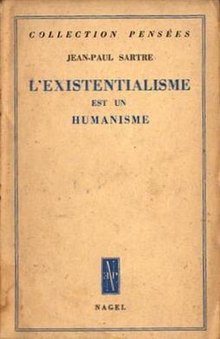Existentialism and Humanism

Cover of the first edition
|
|
| Author | Jean-Paul Sartre |
|---|---|
| Original title | L'existentialisme est un humanisme |
| Translator | Philip Mairet |
| Country | France |
| Language | French |
| Subject | Existentialism |
| Published |
|
| Media type | Print (Hardcover and Paperback) |
| Pages | 70 (English edition) |
| ISBN | |
Existentialism and Humanism (French: L'existentialisme est un humanisme, "Existentialism is a Humanism") is a 1946 philosophical work by Jean-Paul Sartre, based on a lecture called "Existentialism is a Humanism" he gave at Club Maintenant in Paris, on 29 October 1945. Existentialism and Humanism was the title used in the United Kingdom; the work was originally published in the United States as Existentialism. Once a popular starting-point in discussions of Existentialist thought, the work has been criticized by several philosophers. Sartre himself later rejected some of the views he expressed in it and regretted its publication.
Sartre asserts that the key defining concept of existentialism is that the existence of a person is prior to his or her essence. The term "existence precedes essence" subsequently became a maxim of the existentialist movement. Put simply, this means that there is nothing to dictate that person's character, goals in life, and so on; that only the individual can define his or her essence. According to Sartre, "man first of all exists, encounters himself, surges up in the world – and defines himself afterwards".
Thus, Sartre rejects what he calls "deterministic excuses" and claims that people must take responsibility for their behavior. Sartre defines anguish as the emotion that people feel once they realize that they are responsible not just for themselves, but for all humanity. Anguish leads people to realize that their actions guide humanity and allows them to make judgments about others based on their attitude towards freedom. Anguish is also associated with Sartre's notion of , which he defines as optimistic reliance on a set of possibilities that make action possible. Sartre claims that "In fashioning myself, I fashion Man", saying that the individual's action will affect and shape mankind. The being-for-itself uses despair to embrace freedom and take meaningful action in full acceptance of whatever consequences may arise as a result. He also describes abandonment as the loneliness that atheists feel when they realize that there is no God to prescribe a way of life, no guidance for people on how to live; that we're abandoned in the sense of being alone in the universe and the arbiters of our own essence. Sartre closes his work by emphasizing that existentialism, as it is a philosophy of action and one's defining oneself, is optimistic and liberating.
...
Wikipedia
